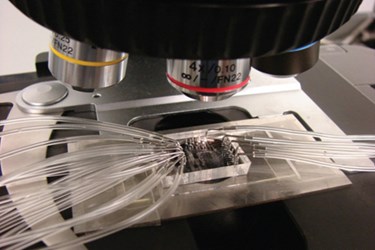New Lab-On-A-Chip Could Detect Early Stage Cancer
By Joel Lindsey

Researchers associated with the Institute of Photonic Sciences in Castelldefels (ICFO) — headquartered in Spain — have created a small lab-on-a-chip device that could lead to new methods for detecting early stage cancer.
“This cancer-tracking nano-device shows great promise as a tool for future cancer treatments, not only because of its reliability, sensitivity and potential low cost, but also because of its easy carry-on portable properties, which is foreseen to facilitate effective diagnosis and suitable treatment procedures in remote places with difficult access to hospitals or medical clinics,” said a press release issued recently by the organization.
The lab-on-a-chip utilizes a specially crafted combination of micro-channels and sensors to detect trace amounts of certain cancer-indicating proteins. Along with the network of tiny micro-channels, the microchip is also equipped with gold nanoparticles that have been chemically programmed with an antibody receptor to attract those proteins associated with the presence of cancer.
When a drop of blood is passed over the chip, blood particles are routed along the micro-channels. If any protein markers are present in the blood, they will stick to the programmed nanoparticles, disrupting and altering what researchers call the “plasmonic resonance.” The magnitude of the changes in “plasmonic resonance” — which is directly indicative of the concentration of protein markers in the blood — is monitored by the microchip, ultimately providing what researchers claim is an accurate and reliable gauge of the patient’s risk for developing cancer.
“Our system offers parallel, real-time inspection of 32 sensing sites distributed across 8 independent microfluidic channels with very high reproducibility/repeatability,” researchers wrote in a paper published recently in the journal Nano Letters. “This enables us to test various sensing strategies for the detection of biomolecules. In particular, we demonstrate the fast detection of relevant cancer biomarkers.”
The paper provides details regarding the new device’s functionality in early tests, and points to researchers’ hopes that the device could enable accurate cancer detection in clinical settings as well as in the field.
“The most fascinating finding is that we are capable of detecting extremely low concentrations of this protein in a matter of minutes, making this device an ultra-high sensitivity, state-of-the-art, powerful instrument that will benefit early detection and treatment monitoring of cancer,” said Romain Quidant, professor at ICFO and coordinator of the lab-on-a-chip project, in an ICFO press release.
